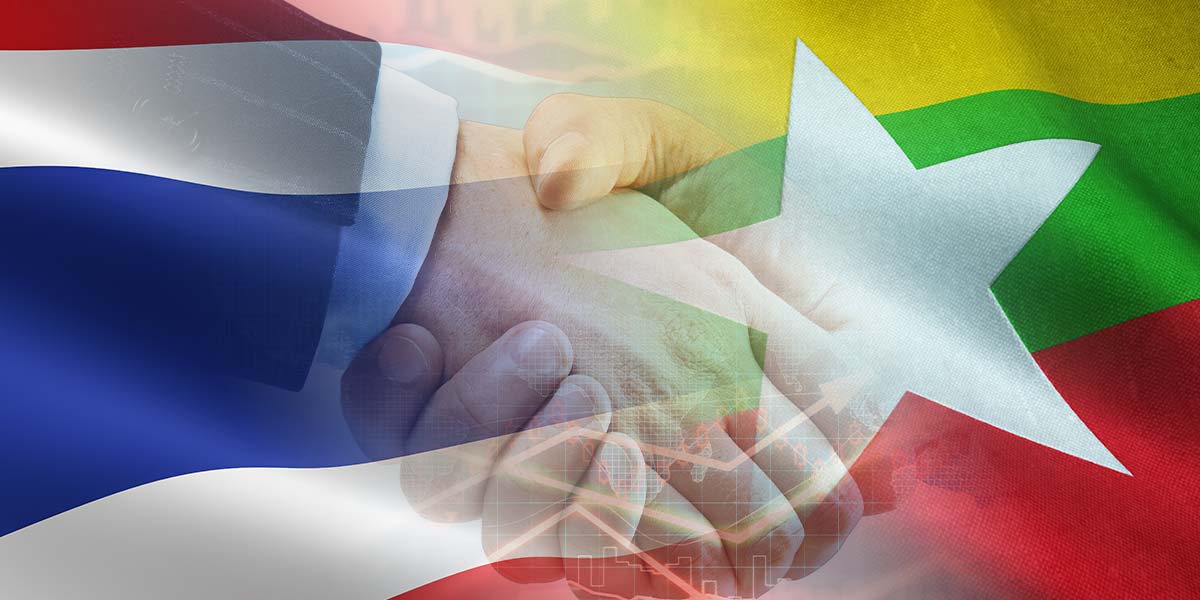New opportunities arose for Thai businesses and investment following the announcement that the United States has removed several Myanmar business figures close to the ruling military junta from its sanctions list, signaling what some suggest could be a significant change in Washington’s approach to Myanmar.
The U.S. Treasury Department lifted restrictions on KT Services & Logistics, the MCM Group, Suntac Technologies, and several of their owners and associates, two weeks after Myanmar’s junta leader openly praised President Donald Trump and appealed for a reduction in U.S. sanctions in a letter responding to a tariff warning.
The affected companies and individuals were originally targeted following the 2021 military coup, which ousted Myanmar’s democratically elected government and drew widespread condemnation over human rights abuses.
The U.S. government provided no explanation for why these allies of the regime were delisted. This policy shift comes as Myanmar seeks to negotiate lower tariffs with the United States and appeal for easing economic barriers, emphasizing opportunities for mutual prosperity.
The backdrop for these developments is the growing global demand for Myanmar’s rich, strategic reserves of rare earth minerals – essential for high-tech defense and consumer applications. Myanmar is one of the world’s key producers outside China, whose dominance in rare earth processing is an ongoing concern for Western nations seeking to diversify supply chains.
Meanwhile, the easing of U.S. sanctions may open the door for renewed engagement between international firms and Myanmar, particularly in sectors such as mining, logistics, and technology.
For Thai and global companies, this could mean new joint venture opportunities, direct investments, and expanded trade—especially in rare earth extraction and processing, where Myanmar has strategic importance.
However, such opportunities are not without risk. Multinationals looking to tap into Myanmar’s resources or reenter the market must weigh the reputational and regulatory challenges associated with doing business in a country still under military rule and subject to intense international scrutiny.
Notably, Osotspa Public Company Limited (SET: OSP) derives an estimated 15-17% of its revenue from the Myanmar market, although the company had divested its bottle manufacturing plant there.
Carabao Group Public Company Limited (SET: CBG) also has considerable interests, with roughly 9% of its total revenue linked to Myanmar operations. Another notable player is Mega Lifesciences Public Company Limited (SET: MEGA), which, based on previous figures, generated about 10-12% of its income from the country.
Meanwhile, PTT Exploration and Production Public Company Limited (SET: PTTEP) remains unaffected for its operations in Yanada and Zawtika projects, both are offshore gas fields in the Andaman Sea, Myanmar.
The trade value between Myanmar and Thailand for 2024 reached THB 250 billion, marking a decrease of 1.5% compared to the same period last year. Of this, Myanmar’s exports to Thailand totaled THB 106 billion, representing a growth of 1.69% year-on-year. Meanwhile, Myanmar’s imports from Thailand amounted to THB 146 billion, which declined by 3.72% compared to the corresponding period of the previous year.
This results in a trade deficit for Myanmar with Thailand, amounting to THB 39,294.65 million.
Currently, Myanmar ranks as Thailand’s 20th largest trading partner overall and is the 8th largest among ASEAN member countries, after Malaysia, Vietnam, Singapore, Indonesia, Cambodia, the Philippines, and the Lao People’s Democratic Republic.
Many countries are eyeing investment opportunities in Myanmar due to its rich natural resources, strategic geographic location, and untapped economic potential. Myanmar holds significant reserves of oil, gas, precious stones, and rare earth minerals, making it an attractive destination for resource-hungry economies, particularly in Asia.
Its position between India, China, and Southeast Asia offers a gateway for trade and connectivity, bolstering its appeal for infrastructure and logistics investments. Additionally, Myanmar’s young labor force and low production costs present opportunities for industries such as manufacturing and agriculture.
The sanction lifted on key allies of Myanmar’s government by Washington could be seen as a positive sign that the ruling junta is moving closer to deescalate internal tensions with the help from ASEAN as mediators.





